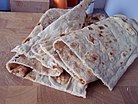 Kulcha with chole from India | |
| Type | Flatbread |
|---|---|
| Region or state | Punjab |
| Associated cuisine | Pakistani, Indian, Punjabi |
| Main ingredients | Maida |
Kulcha is a Persian term for a disc-shaped loaf of leavened bread.[1] In India, this term is commonly used for regular English bread (which is disc-shaped).[2]
Origin and terminology
[edit]The term kulcha is Persian and describes a disc-shaped loaf of bread, bun or even biscuit.[1][3] However, in India this term came to be associated with round breads popularized during the British colonial period.[4] In some parts of India, naan or tandoori parantha is often confused with kulcha.
Preparation
[edit]Kulcha is made from maida flour, water, a pinch of salt and a leavening agent (yeast, sourdough or old kulcha dough), mixed together by hand to make a soft dough. This dough is covered with a wet cloth and left to rest for an hour or so in a warm place. The result is a slight leavening of the dough but not much. The flour is kneaded again by hand and then rolled out using a rolling pin into a flat, round shape. In commercial establishments, it is baked in an earthen clay oven ("tandoor") until done, but in most Indian homes they are cooked on an open girdle, tava or pan. After cooking, it is taken off the fire and optionally brushed with butter or ghee for a shiny, appetizing appearance. It is usually served with an Indian curry, in particular, a spicy chickpea curry known as chana masala.[5]
Variations
[edit]Among variations, instead of using water to knead the dough, milk or yogurt can be used; which results in a softer and elastic dough enhancing the gluten binding process within the dough. This type of kulcha is known as doodhia kulcha (milk kulcha). Leavening is higher when yogurt is used to prepare the dough.
This variant of kulchas is not stuffed but made plain and eaten with a curry which can be either vegetarian or meat-based.
The second variant is the kulchas stuffed with fillings that were served during the period of the Mughals and Nizams in their Darbars.[6] For example, in the Awadh region, Awadhi Kulcha is served with Nahari, a mutton based dish.[7]
Nowadays, these are sold in restaurants and shops. Jammu's Kaladi Kulcha which is made with traditional Dogra Cheese i.e. Kaladi Cheese is one of the most-loved street foods in Jammu.[8] Kaladi cheese is sautéed in oil on a pan, cooked till brown in colour on both sides and stuffed between roasted kulchas.[9]
In Amritsar, Kulcha is often confused with tandoori parantha or naans which have become popular there in recent decades.[10]
In entire North India, a range of stuffings, including paneer (cottage cheese), potatoes, radish, onion and other vegetables are used to stuff these kulchas.
| External image | |
|---|---|
In Pakistan, kulcha breads are largely eaten in certain parts of the Hazara and Pothwhar regions, where they are a popular breakfast item.[11]
See also
[edit]References
[edit]- ^ a b Steingass, Francis; Richardson, John; Johnson, Francis (1892). A Comprehensive Persian-English Dictionary: Including the Arabic Words and Phrases to be Met with in Persian Literature, Being Johnson and Richardson's Persian, Arabic, and English Dictionary Rev., Enl., and Entirely Reconstructed. Allen.
- ^ Tripathi, Vaishali (9 August 2016). Indian desi tadka. Onlinegatha. p. 26. ISBN 9789385818004.
Tandoori Roti, naan and kulcha, originated in Punjab region, are delicious meals of Delhi.
- ^ "Definition of کلیچه". Dehkhoda Lexicon Institute and International Center for Persian Studies. Retrieved 4 April 2023.
- ^ Manfield, Christine (4 November 2021). Christine Manfield's Indian Cooking Class. Simon and Schuster. ISBN 978-1-76085-244-3.
- ^ Haldar, Suman (14 December 2021). "Amritsari Kulcha". one in abillion blog. Retrieved 15 December 2021.
- ^ Hussein, Sadaf (19 August 2017). "Hidden Secrets of Amritsari Kulcha". Food and Streets by Sadaf. Archived from the original on 11 January 2020. Retrieved 5 October 2019.
- ^ Brien, Charmaine O' (15 December 2013). The Penguin Food Guide to India. Penguin UK. ISBN 978-93-5118-575-8.
- ^ "Kaladi Experience". Daily Excelsior. 5 December 2020. Retrieved 27 March 2021.
- ^ Hussein, Sadaf (10 March 2021). "How kulchas from India and Pakistan act as a great unifier". Mintlounge. Retrieved 27 March 2021.
- ^ "Kulcha- the everlasting love of Amritsaris". Amritsar Online. 8 April 2019. Archived from the original on 8 January 2020. Retrieved 5 October 2019.
- ^ Naeemu, Waqas (2 November 2012). "Traditional foods: In Pindi, a place for Kashmiri bread lovers". Express Tribune. Retrieved 14 November 2012.
External links
[edit] Media related to Kulcha at Wikimedia Commons
Media related to Kulcha at Wikimedia Commons



